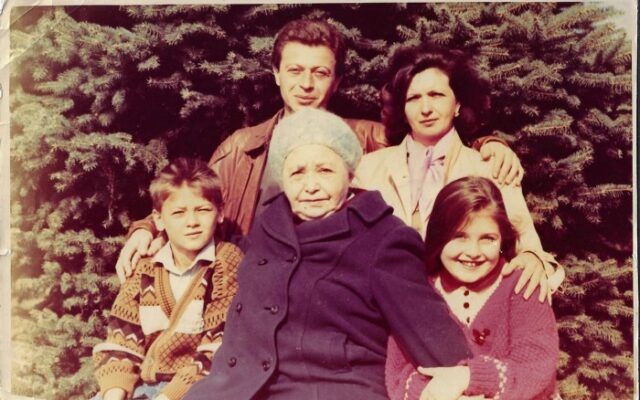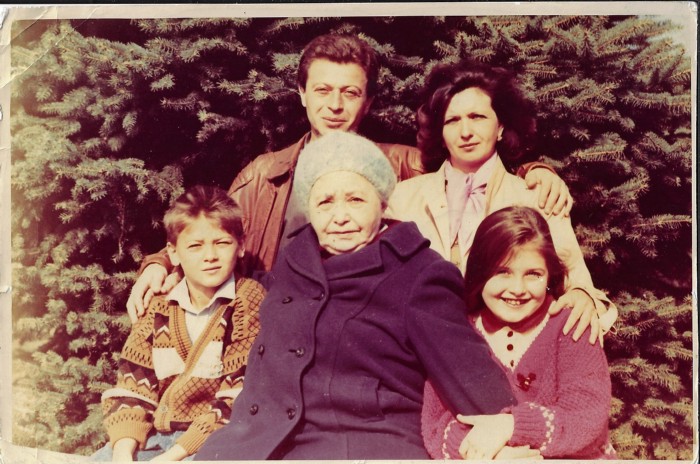
There are ways to help people in Ukraine from Maine
When my parents and two older siblings still lived in Znamenka, in central Ukraine, my grandmother, Valentina, would often make a big batch of piroshki to feed the family throughout the week.
The dough pockets, with either sweet or savory fillings, were fried in hot oil for a crispy golden crust on the outside and light and airy texture on the inside. My grandmother stuffed the piroshki with all kinds of fillings, from sweet homemade jams and cooked apples to buttery mashed potatoes, meat, fried cabbage and green onion with boiled eggs.
My sister, a child at the time, stopped at home during a break from playing outside and asked if she could take a couple piroshki to share with friends. Of course, my grandmother said yes, and while her back was turned, Kristina wrapped her small arms around the bowl and took off.
A little while later, Kristina returned, the bowl empty. She had fed the entire neighborhood’s children, mostly boys who devoured the heavenly dough pockets in minutes.
My grandmother was astonished. “Where did they all go?” she said.
“You said I could take some,” Kristina said, smiling.
So my grandmother would turn around and make a bunch more.
This is a story my mother has told around the dinner table dozens of times. Something that once made me roll my eyes because I’d heard it too many times now has new meaning as Ukranians continue to fiercely protect their land and freedom and fight a full-scale invasion from Russian forces.
The other day, I watched as journalist Sudarsan Raghavan showed groups of Ukrainian women in Kyiv, singing folk songs and cooking for soldiers and territorial defense forces who have stayed behind to defend their country as a million women and children have fled.
Ukrainian people are incredibly generous. They take care of their neighbors. Babushki (grandmothers) sit for hours on benches, looking after the neighborhood children playing outside. Sometimes when my mother would return home from work, an older neighbor would shout to her from a window that the kids were clean and fed.

This is Bangor Daily News reporter Valerie Royzman’s family in Ukraine in 1993, the year they immigrated from Znamenka, Ukraine, to Toledo, Ohio. Pictured in the front row, left to right, are brother Eugene, paternal grandmother Tatyana and sister Kristina. Valerie’s parents, Michael and Irena, are also pictured. Valerie was born four years later.
“We are open. We are friendly,” said my mother, Irena. “People respect each other. If guests come to your house, you serve them the best food in your refrigerator. You will not save it for yourself because somebody might say, ‘They are greedy.’
“Sometimes neighbors could stop by without an invitation and bring a plate of blinchiki (a Ukrainian version of thin pancakes), just because. You easily lent money when people needed it. There was never the thought that they would not return this.”
Being an ocean away from my family members in Znamenka, Kropyvnytskyi, Odessa and Kyiv and worrying for their safety has left me especially fragile this last week. Sometimes I watch gut-wrenching stories on the news and feel numb. Other times I am completely overcome with emotion. Dread, guilt, deep sadness. There are occasional flickers of hope. I can’t exactly describe what I feel. I have never felt this way before.
My family is living in fear, exhausted from constant shelling and unable to sleep. Some are afraid to step outside or have very few chances to because of curfews and frequent sirens signaling people to seek shelter. My recently remarried cousin worries because her husband has volunteered to train and fight to defend Ukraine. Still, some send reassuring messages.
“Ukraine is not going to give up,” my cousin writes from a basement in Odessa. “We are a strong nation, our soldiers, despite the superiority of the enemies in numbers, continue to defend our country. Ukraine is now united more than ever. We are friends, and we help each other as much as we can.”
As I watch the war from my home in Maine, many have asked how they can help Ukrainians in meaningful ways. I connected with my family and other Ukrainians and gave it some thought. Here’s what I can suggest right now.
Donate to organizations aiding Ukraine
If you want to help and are able to financially support Ukraine, make sure you’re giving to a reputable organization. It can be overwhelming to sort through the organizations raising money and supplies right now because there are so many doing good work, but a few are listed below. I suggest supporting an effort that will directly benefit the people suffering in Ukraine now, whether that’s medical supplies for hospitals or getting food and clothing to those fleeing from the crisis.
- Come Back Alive Foundation was recommended by Iaryna Iasenytska, a native of Ukraine and University of Maine graduate who is in Kyiv. The organization funds defensive initiatives for the Armed Forces of Ukraine. It doesn’t use funds to buy weaponry, rather it supplies ammunition, training and technology, according to its website. Donate here. The National Bank of Ukraine opened an account specifically to support the country’s armed forces, which you can contribute to here. The bank is also collecting funds for the Ministry of Social Policy of Ukraine, which it will use for humanitarian aid. Find more information and donate here.
- Geneva-based International Committee of the Red Cross has been working in Ukraine since 2014 to provide emergency assistance and give hospitals medical equipment. The organization, with partners in the Red Cross and Red Crescent Movement, hopes to help more than 3 million people access clean water and improve living conditions for the more than 66,000 whose homes have been destroyed, its website said. Donate here.
- World Central Kitchen, a nonprofit founded by chef and humanitarian José Andrés, and its volunteers have been at border crossings in Poland. His mission is to serve hot meals to hungry refugees. The organization is also establishing meal distribution points in Hungary, Moldova and Romania. Donate here.
Another option is to donate to media organizations. Journalists with the Kyiv Independent have done an excellent job providing extensive and detailed coverage of the war. The English-language outlet launched in November 2021 after the Kyiv Post fired its employees and shut down after 26 years. Donate to the newsroom’s GoFundMe page.
If you’d like to donate your time and energy, look for events and fundraisers in your local area.
A bake sale scheduled for 2 p.m. on Saturday at Stillwater Park Playground in Bangor will donate to organizations providing humanitarian and crisis care to Ukraine. Half of the proceeds will go to Razom Inc., and the other half to the International Rescue Committee. Kristin Vekasi, who teaches political science and international affairs at the University of Maine, organized the event. You can view details on Facebook.
Events are happening in other Maine communities, too, like screenings of the film “Red Dawn” at 1 and 7 p.m. Sunday, March 13, at the Center Theatre, 20 East Main St., Dover-Foxcroft. One of the theater’s donors suggested the idea and organized the effort, which will give admission donations to Doctors Without Borders, an organization that provides medical care during humanitarian crises.
Read and watch the news, but make sure it’s reliable
I’m a journalist, so of course I think it’s important to keep up with current events. Everywhere you turn, it seems the world is talking about the bombs falling on Ukraine and predicting what will happen next.
Make sure you’re following credible sources before sharing a post on Facebook or Twitter. Don’t spread misinformation or fall for the Russian government’s propaganda tactics. Russian President Vladimir Putin has told his citizens that troops were sent to neighboring Ukraine to carry out a “special military operation” for the “demilitarization and de-Nazification of Ukraine.”
In recent news, Russia blocked access to some foreign news organizations’ websites, including the BBC and Voice of America, for spreading what it alleged was false information about the war.
Also remember to rest and take breaks from the news. Consuming too much stressful and emotional news can really have an effect on our mental and physical health. Silence your notifications if you have to, and carve out time during the day to take a walk, watch an episode of your favorite TV show — I’m going to recommend “Servant of the People,” starring Ukrainian President Volodymyr Zelenskyy — or just be.
Support and spread a little love
If you know someone in Ukraine, or you have some connection to the country, now is the time to be supportive. Call, email, send a message. Be tender. Give love. Check in on Ukrainians here in America and those stranded in a beautiful country that has now become a war zone.
I have received many prayers and warm words from friends, coworkers, former teachers and professors and even strangers. I have made an effort to pass the kindness along to my family members, who say it means a lot and keeps the hope alive. If you’re the praying kind and believe that helps, say a prayer. If you aren’t, do whatever you do when you’re thinking of someone and want them to get better. Be a human. Wish some goodness into the world.
I am asking you to bear witness to Ukraine’s suffering. As dark as it sounds, I am afraid that my family is going to die. I am worried that the house my grandparents built with their own hands, brick by brick, will be obliterated. I have a nagging fear that there will be no Ukraine to return to – no country and sunflower fields my brother and sister can show their children. My great-grandmother’s name is Nadezhda, or Nadya for short, which means hope. Don’t look away, even when it hurts.
Valerie Royzman is a reporter for the Bangor Daily News/Piscataquis Observer originally from Toledo, Ohio. Valerie is a proud daughter of immigrants from Ukraine. She has relatives in Kropyvnytskyi (formerly known as Kirovohrad), Odessa and Kyiv. Quotes from her family were translated from Russian to English.